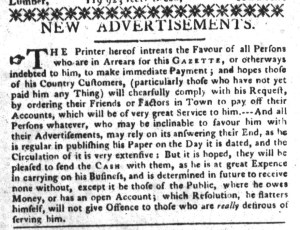What was advertised in a colonial American newspaper 250 years ago today?

“All Persons whatever, who may be inclinable to favour him with their Advertisements, may rely on its answering their End.”
The “NEW ADVERTISEMENTS” in the March 15, 1774, edition of the South-Carolina Gazette and Country Journalbegan with a notice from the printer, Charles Crouch. Like his counterparts throughout the colonies, Crouch occasionally issued a call for “all Persons who are in Arrear for this GAZETTE, or otherways indebted to him, to make immediate Payment.” Recognizing that many of his subscribers lived outside Charleston, he requested that “his Country Customers … will cheerfully comply” by directing “their Friends or Factors in Town to pay off their Accounts.” In particular, he pointedly suggested that “those who have not yet paid him any Thing” would tend to what they owed. When they ran notices for similar purposes, some printers asserted that certain customers had not made payments for years, taking advantage of credit extended to them.
How did Crouch and other printers manage to stay in business under such circumstances. Many, but not all, required advertisers to pay in advance, figuring that advertising generated enough revenue to offset shortfalls from subscriptions. That was the case for Crouch and the South-Carolina Gazette and Country Journal. He instructed advertisers “send the CASH” when they submitted copy to the printing office. After all, “he is at great Expence in carrying on his Business.” Accordingly, Crouch was “determined in future to receive none without,” suggesting that perhaps he had accepted advertisements without “the CASH” in the past. The printer made an exception for those he “owes Money, or has an open Account,” presumably counting new advertisements against his own debts.
In hopes of attracting new advertisers, Crouch commented on the effectiveness of inserting notices in his newspaper. Advertisers could “rely on its answering their End” or serving their purpose, whether disseminating information or enticing customers or whatever other reason they had for advertising. He competed against two other newspapers published in Charleston, the South-Carolina Gazette and the South-Carolina and American General Gazette. Prospective advertisers should choose the South-Carolina Gazette and Country Journal, Crouch stated, because “the Circulation of it is very extensive.” In other words, the newspaper reached many readers. In addition, Crouch bragged that he was “regular in publishing his Paper on the Day it is dated,” taking a swipe at other competitors who sometimes delayed printing and distributing their weekly newspapers. Advertisers could depend on their notices in the South-Carolina Gazette and Country Journal reaching readers in a timely manner. At the same time, he tended to settling accounts with existing customers, Crouch sought additional customers who had reason to advertise.
